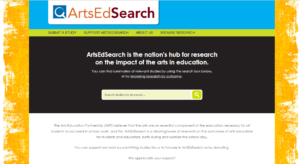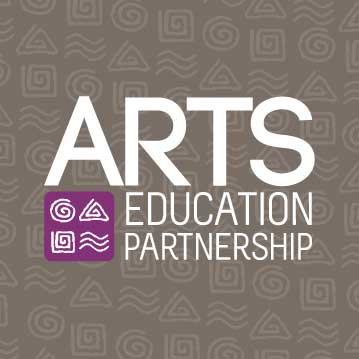Education Commission of the States believes that informed policymakers are the best decision makers – by having the background, research, analysis and insights needed to make effective education policy, leaders across the country can take important steps to improve education outcomes for all students.
 Five years ago, the Arts Education Partnership (AEP) established the ArtsEdSearch website, providing critical research to support policymakers in their decisions to expand access to high-quality arts education in their states and communities. This year, AEP is thrilled to announce the addition of the 250th research study to the ArtsEdSearch database, cementing the place of this important resource as a critical bookmark in any education leaders’ internet browser.
Five years ago, the Arts Education Partnership (AEP) established the ArtsEdSearch website, providing critical research to support policymakers in their decisions to expand access to high-quality arts education in their states and communities. This year, AEP is thrilled to announce the addition of the 250th research study to the ArtsEdSearch database, cementing the place of this important resource as a critical bookmark in any education leaders’ internet browser.
ArtsEdSearch is a clearinghouse of research on the outcomes of arts education for students and educators, both during and outside the school day. Through ArtsEdSearch, we compile, summarize and organize research conducted on the impact of the arts in education to inform policies and practices across the four priority areas of the 2020 Action Agenda.
The 250th study added to ArtsEdSearch is from the Youth Theatre Journal, and titled “Contribution of Drama-Based Strategies,” by Elain M. Walker, Lauren Bosworth McFadden, Carmine Tabone and Martin Finkelstein. Building on a stream of educational research focused on the impact of the arts on performance in non-arts academic subjects, this three year longitudinal study investigated the impact of integrating theatre arts into the language arts and social studies curricula on fourth- and fifth-grade students’ cognitive, procognitive and prosocial development through the Theatre Infusion project. The findings provided evidence on the contribution of the arts in strengthening students’ performance in the non-arts curricular areas.
The data revealed that students who were in the treatment group demonstrated significant improvement over students in the control group in language arts. Overall, students were 42% more likely to pass proficiency on a language arts state standards test, even after controlling for gender and socioeconomic background. Results for social studies improvement, however, were mixed. The earlier a student was exposed to theater arts integration, the more likely they were to earn higher grades.
This study has important implications for policymakers considering the inclusion and integration of arts and music into standard curriculum. The assumption that student learning in tested subjects can only be facilitated by direct instruction of these subjects is not supported by the results of this study, which finds arts integration as a more effective means of instruction for proficiency outcomes than direct instruction. Exposure to arts at an earlier trajectory of a student’s history increases success in future years, and lack of exposure decreases the success of a student.
This study has been added to the already large body of research from leading researchers in the field that spans across all arts disciplines and age levels. ArtsEdSearch is designed to be an interactive, living resource that will grow and evolve along with arts and education research and practice that users can explore through four different perspectives:
- The outcomes of arts education for students.
- The outcomes of incorporating arts into instruction for educators.
- The outcomes of arts education that occurs during the school day.
- The outcomes of arts education that occurs out-of-school.
For each of the perspectives above, you may choose to read a research overview, explore the research by age level, investigate the policy implications of the research and perform an advanced search to find studies specific to your work.
AEP developed ArtsEdSearch as a resource for policymakers, education stakeholders and leaders to better understand and articulate the role that arts education can play in preparing students to succeed in the changing contexts of the 21st Century. Stay up to date on the latest research, policy and practice in the arts in education field by subscribing to the ArtsEd Digest and following us on Twitter and Facebook.







